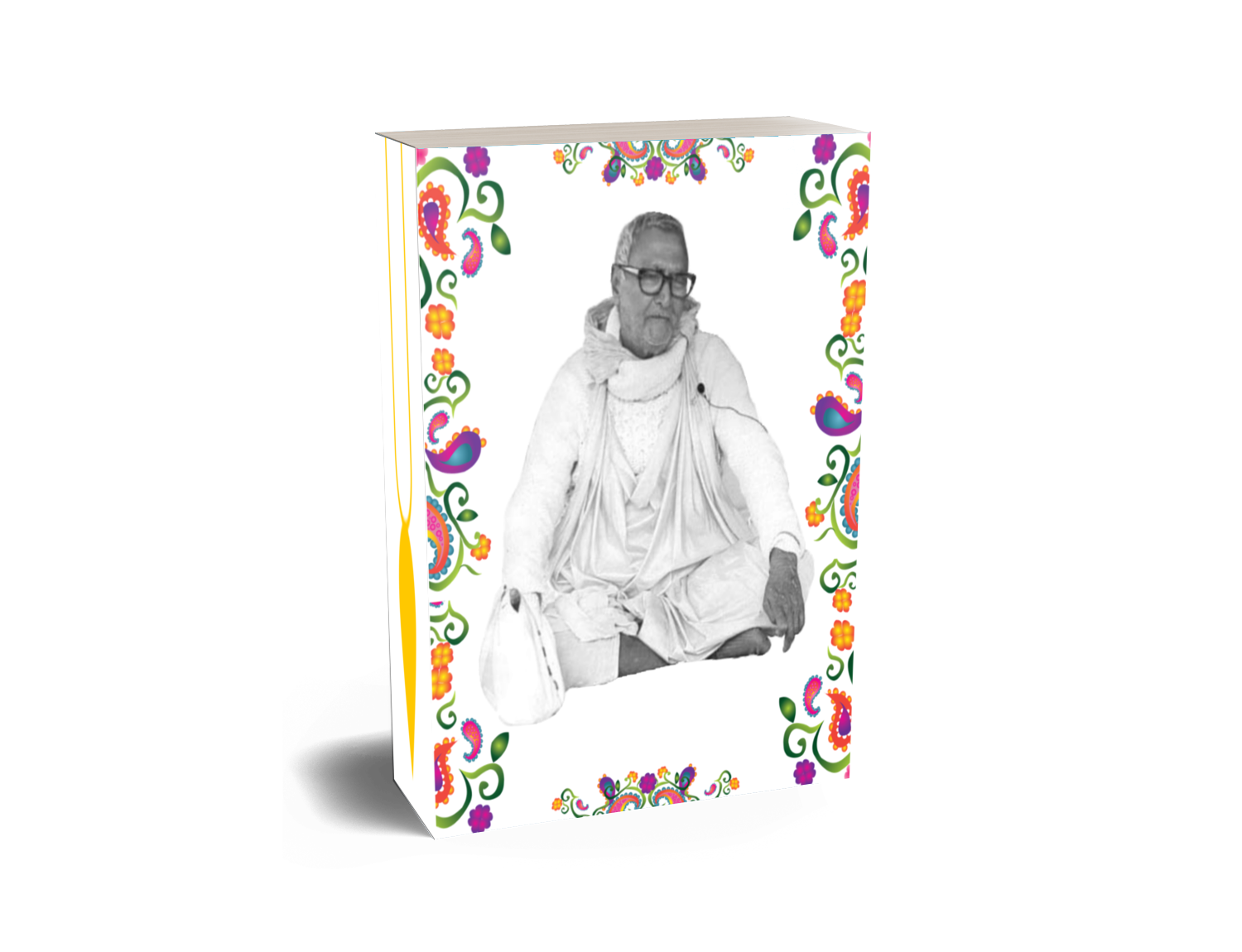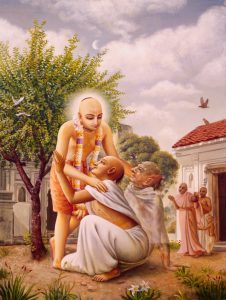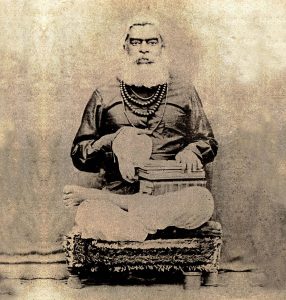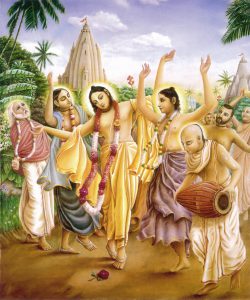

The following is an excerpt from Centennial Anthology by Śrīla Bhakti Rakṣaka Śrīdhara Mahārāja, published in Rays of The Harmonist, Winter 2001
In Kṛṣṇa consciousness the quality of wholesale dedication is necessary. It is indispensable. Partial dedication will not do; in connection with Kṛṣṇa the demand is wholesale, and nothing less will do. He is an autocrat. The demand from the autocrat is categorically different. Kṛṣṇa is not satisfied with any partial service. He wants to swallow the whole thing, nothing less. He has the demand of an autocrat, but He is the absolute good, He is the beautiful, He is the harmony, and He is the love—but His demand is such.
Self-giving is the symptom of śraddhā, faith. Without self-giving, intellectualism will have no value. Reading scriptures will have no value, and also the physical association of the sādhu will have no value if there is no śraddhā. Many living entities including bugs and mosquitos have a physical association with the sādhus, but  association through dedication is necessary. Śraddhā is all-important. To have śraddhā means to have the mood that if we dedicate everything to Kṛṣṇa, we will get everything. We will achieve whatever is necessary: wholesale fulfilment. The path of that is dedication, śraddhā, and sevā, service, and therefore our Guru Mahārāja laid much emphasis on service. We were not allowed so much to read even Śrīmad-Bhāgavatam or the books by the Six Gosvāmīs, but our time was to be utilised in service.
association through dedication is necessary. Śraddhā is all-important. To have śraddhā means to have the mood that if we dedicate everything to Kṛṣṇa, we will get everything. We will achieve whatever is necessary: wholesale fulfilment. The path of that is dedication, śraddhā, and sevā, service, and therefore our Guru Mahārāja laid much emphasis on service. We were not allowed so much to read even Śrīmad-Bhāgavatam or the books by the Six Gosvāmīs, but our time was to be utilised in service.
The serving nature will connect you with the real thing. Neither scriptural knowledge nor the close association with a saint has any meaning if it is not done with dedication, self-surrender, self-giving. Physical association alone has no meaning. It must all be done through śraddhā, and service, so much so that if a sādhu or Guru asks, “Read this book,” then it will be service; but if I read a book to enhance my knowledge, it may be jñāna but not service. We can only have real progress through sevonmukhe hi jihvādau, otherwise everything may be an imitation. If we do not approach with the spirit of service, everything may be an imitation, and we won’t come in contact with reality. This is the most important point, and it is the speciality of the Gauḍīya Maṭha, our Ācāryas, our Gurudevas, and also of Mahāprabhu and Rūpa Gosvāmī.
Surrender, service, and dedication: this is the key to deal with the infinite—Vaikuṇṭha. Without knowledge and without much energy one can attain fulfilment. It is not necessary to have the energy to be able to move a mountain. Also to read all the scriptures in the world and put them “within our belly” will not produce any good.
A typical example was shown in the Mahābhārata. Kṛṣṇa foretold that when the rājasuya-yajña of Mahārāja Yudhiṣṭhira would be finished, a particular bell there would ring automatically. In that way everyone would know that the yajña was completed. The sacrifice was held and everything was finished, but the bell did not ring. Bhīma asked Kṛṣṇa, “You said that the bell would ring automatically. Everything has now been finished but it is not ringing. Why not?”
Kṛṣṇa replied, “No. One thing is still remaining.”
“What is that?”
“Vaiṣṇava-sevā, the service of a Vaiṣṇava.”
Bhīma was surprised: “What do You say? So many munis, ṛṣis, Nārada, Vyāsadeva, and even You Yourself, are all satisfied with having been well fed, yet You say that Vaiṣṇava-sevā has not been done?”
“Yes.”
“So where is that Vaiṣṇava?”
Kṛṣṇa then indicated, “Go to the outskirts of town, and there you will find a particular Vaiṣṇava of the lowest caste. He does not go anywhere, but he is satisfied by taking the Name of the Lord and leading a full life of devotion without any care for the world.”
caste. He does not go anywhere, but he is satisfied by taking the Name of the Lord and leading a full life of devotion without any care for the world.”
Hearing this, the Pāṇḍavas went with a chariot to receive that man. They found him, an ordinary poor man of the lower class, and they approached him. He was perplexed: “What is this? Oh, so many important men have come to my cottage. What is the matter?” He became very much panic-stricken.
Then they petitioned him with folded palms, “We have come to bring you to take some food at the place of the yajña.” What to do? He could not avoid their order. Draupadī had to cook, so she prepared various palatable dishes. She thought, “Vaiṣṇava-sevā has not been done. So many ṛṣis, munis, and even Lord Kṛṣṇa has been fed, but Vaiṣṇava-sevā has not been done!” So with all her skill she cooked foods of various types, and the man was fed—but the bell did not ring.
Bhīma asked, “What is the matter? He has finished eating but the bell has not rung.”
Kṛṣṇa said, “There must have been some offence against vaiṣṇava-sevā, and therefore the bell did not ring. What do you say?—Do any of you have any doubt or bad conception about this man?”
The Pāṇḍavas then asked one another if any of them had thought any evil about him. At last Draupadī admitted, “I had some thought in my mind that the man is low-born, and although I prepared so many curries with the utmost attention and skill, he mixed all the preparations together and then ate that. He does not know how to eat because he comes from a very low class—this is what I had in my mind.”
Kṛṣṇa explained, “There is some contempt for the Vaiṣṇava, and therefore the bell has not rung. There is no  other course than for you to go to him again, bring him, and again feed him.”
other course than for you to go to him again, bring him, and again feed him.”
So the Pāṇḍavas went and brought him back. This time all of them waited with great respect as he took prasādam, and the bell rang with every morsel.
This example has been shown to us. Those who are niṣkiñcana do not want anything—no name, no fame, or anything of the kind. They are naturally satisfied with whatever comes, and they are wholesale dedicated to the Lord. Such devotion can be found anywhere without any show of grandeur. No worldly grandeur is necessary; just richness of the heart—no knowledge, no education, no honour of a high birth, no power, and no gorgeousness. Kṛṣṇa consciousness is so full, so sufficient, so absolute, that just a particle of that contains everything. All grandeur, all education, and everything is there: it is of such a nature. Service, self-dedication, śaraṇāgati, surrender: that is the necessity, not valour or learning.
api cet su-durācāro
bhajate mām ananya-bhāk
(Śrīmad Bhagavad-gītā 9.30)
“You fail to understand, but he is all right. He must be thought to be a sādhu, a truly honest man, and nothing else. He may have no name or fame or good presentation, or any of the qualities that attract us; none of these are necessary.”
Self-contentment does not require anything. It can stand alone. It is self-sufficient. Kṛṣṇa consciousness is self-sufficient. It does not require any form of paraphernalia to establish itself; it is a self-established thing. With it there will be no need of hankering for anything, whether it be grandeur or anything else.
There was a brāhmaṇa Vaiṣṇava named Vāsudeva Vipra in Kurma-Kṣetra just south of Purī. He was a leper,  but what type of leper? He had such compassion that when any worms would fall from the sores on his body, he would pick them up and place them back in the wounds to prevent their dying. One day he found within his mind, “The Lord is coming to a place nearby and I shall have a chance to have His darśana.”
but what type of leper? He had such compassion that when any worms would fall from the sores on his body, he would pick them up and place them back in the wounds to prevent their dying. One day he found within his mind, “The Lord is coming to a place nearby and I shall have a chance to have His darśana.”
Mahāprabhu went to that district, but by the time Vāsudeva arrived there, Mahāprabhu had already left. Vāsudeva was greatly disappointed and fell to the floor, crying, “What misfortune! I could not have His darśana, not even a glimpse of the Lord, and He has now left. I am too unqualified to meet Him.”
Mahāprabhu went almost a mile when suddenly He felt some attraction pulling Him back. He ran back, found that leper, and embraced him. The leper body vanished and turned into a beautiful figure. Such was the devotion of Vāsudeva Vipra.
The devotees feel themselves to be the poorest of the poor, the humblest of the humble—ātma dainya. Tṛnād api sunīcena, taror api sahiṣṇunā: they feel themselves to be lower than a blade of grass.
Śrīla Bhaktivinoda Ṭhākura has written that in general, the measurement of a Vaiṣṇava is according to his degree of humility—his natural, real humility. Only a show of humility has no value. Imitation has no value anywhere. Proper humility can only come when one feels his connection with the autocratic Lord and Master. Then only can he feel himself as humble: the master is the autocrat and the servant has no position. This is a matter of realization and not a ‘mathematical’ truth. In connection with the autocrat he has no position, and if he accepts this naturally, not artificially, he will automatically be the humblest. The servant of an autocrat has no position and no ego whatsoever, and therefore he will possess natural humility—and that is his wealth. What sort of wealth is that? It is such that it can capture the autocrat. Service is of that type. A real servant has such a position in relation to the master, and vice versa; the master is also addicted to his servant. One party is surrendering, and the master is also naturally attracted to that sincere servant.
The Lord is an autocrat, but He is not heartless. So the devotee who is the richest is the lowest. The meanest, the poorest, is the richest. This is Kṛṣṇa consciousness. Service is necessary, nothing else. We must find out how to develop that innate tendency so our body may be made of that stuff and nothing else. How is this possible? Śraddhā will make us understand. Sincerely hankering we will feel, “Yes. This is the highest; we want that.” Sincere hankering, faith, and greed for that are necessary—laulyam api mūlyam ekalaṁ. If you want it, you can have it. Such is that plane. It is a plane of natural transactions, but we do not want it; therefore we are culprits. Sincere wanting from the core of the heart is the only necessity—nothing else. Without that we must think of ourselves to be sham devotees, only showing their attire. But if real inner hankering exists, it will be wholesale genuine. Wholly want, and you can have. Laulyam api mūlyam ekalaṁ—but there must not be any adulteration in that wanting. It must be sincere — laulyam. If you want, you can have. It is a most simple thing. It is most natural and most gentleman-like: “If you want, you can have. No complaint can come against you from any quarter. But if you do not want, then don’t have.” Laulyam api mūlyam ekalaṁ. The only price is to really want it. Don’t misuse it. Understand the value of it, want it, and you will have it.
Śraddhā is the real regard to have. This is the crux, and this is the highest aim, and only this can satisfy our inner thirst. The innermost thirst can be quenched only by this. By giving your small self you can gain the whole infinite.
So what is needed from us? Sincere hankering.
How to develop that? With the contact of the sādhu and with the help of the scriptures we can try to increase that inner feeling.
That inner demand can only be satisfied by Kṛṣṇa consciousness. It will satisfy our innermost demand. This is the justification of the saying sarva-dharmān parityajya, mām ekaṁ śaraṇaṁ vraja (Śrīmad Bhagavad-gītā 18.66). “Give up all conceptions and phases of duty. Whatever call of duty comes to you, give it up.” This is such a high theory. “I am everything to you. Sarva-dharmān—all conceptions of duty are to be given up, and—mām ekaṁ—only Myself exists as your single concern: this is the position of Myself and yourself by nature and constitution. Try to understand and do that, and you will find that everything undesirable, sinful, and reactionary will vanish—ahaṁ tvāṁ sarva-pāpebhyo. Mokṣayiṣyāmi mā śucaḥ—no necessity for repentance will come to you. Only you will get full satisfaction.” This is the greatest assurance that has ever been found so clearly and boldly expressed. “Give up all phases of duty and come to Me alone, and you won’t have to repent for any loss.” This call is clear, bold, straight, and direct, and it is the conclusion of Śrīmad Bhagavad-gītā where so many phases of duty have been dealt with that almost all have been covered. Mahāprabhu said,
yāre dekha, tāre kaha ‘kṛṣṇa’-upadeśa
āmāra ājñāya guru hañā tāra’ ei deśa
(Śrī Caitanya-caritāmṛta, Madhya 7.128)
“If you want to do anything good to the world, talk about Kṛṣṇa. Try to distribute Him—He who can compensate for all other alternatives. Only try to distribute that central, absolute thing to help the people and the environment, and don’t have any other sort of duty. Only try to distribute this teaching of sarva-dharmān parityajya, mām ekaṁ śaraṇaṁ vraja to whomever you meet. If you want to do good to others, only give this highest thing. Engage yourself in this way and you will become more and more confirmed in your position, and so many others will be benefitted. No other more holy duty than this can be there.”
Especially in this Age of Kali we are to engage in this kṛṣṇa-kīrtana: talk about Kṛṣṇa, distribute Him. Everyone is hard-hearted or heartless, so go out and distribute heart to everyone. Distribute everywhere the heart of the heart; the real sweetheart—distribute it to everyone. This is the most holy campaign and engagement, so what more can we invest in?
Mahāprabhu said, yāre dekha, tāre kaha ‘kṛṣṇa’-upadeśa: “Understand that I order you to do this, therefore the dirt of any ego that you have become a Guru and are distributing Kṛṣṇa consciousness will not touch you. Keeping on your head that this is My order, go on with this distribution of Kṛṣṇa consciousness. There is no other subject of discussion. Whomever you meet, talk to them only about Kṛṣṇa; talk about their heart of hearts.”
Everywhere the key is in the spirit of surrender, service, and dedication—sevonmukhe hi jihvādau.
Image/Art made possible by Pixabay.com & Krishnapath.org








